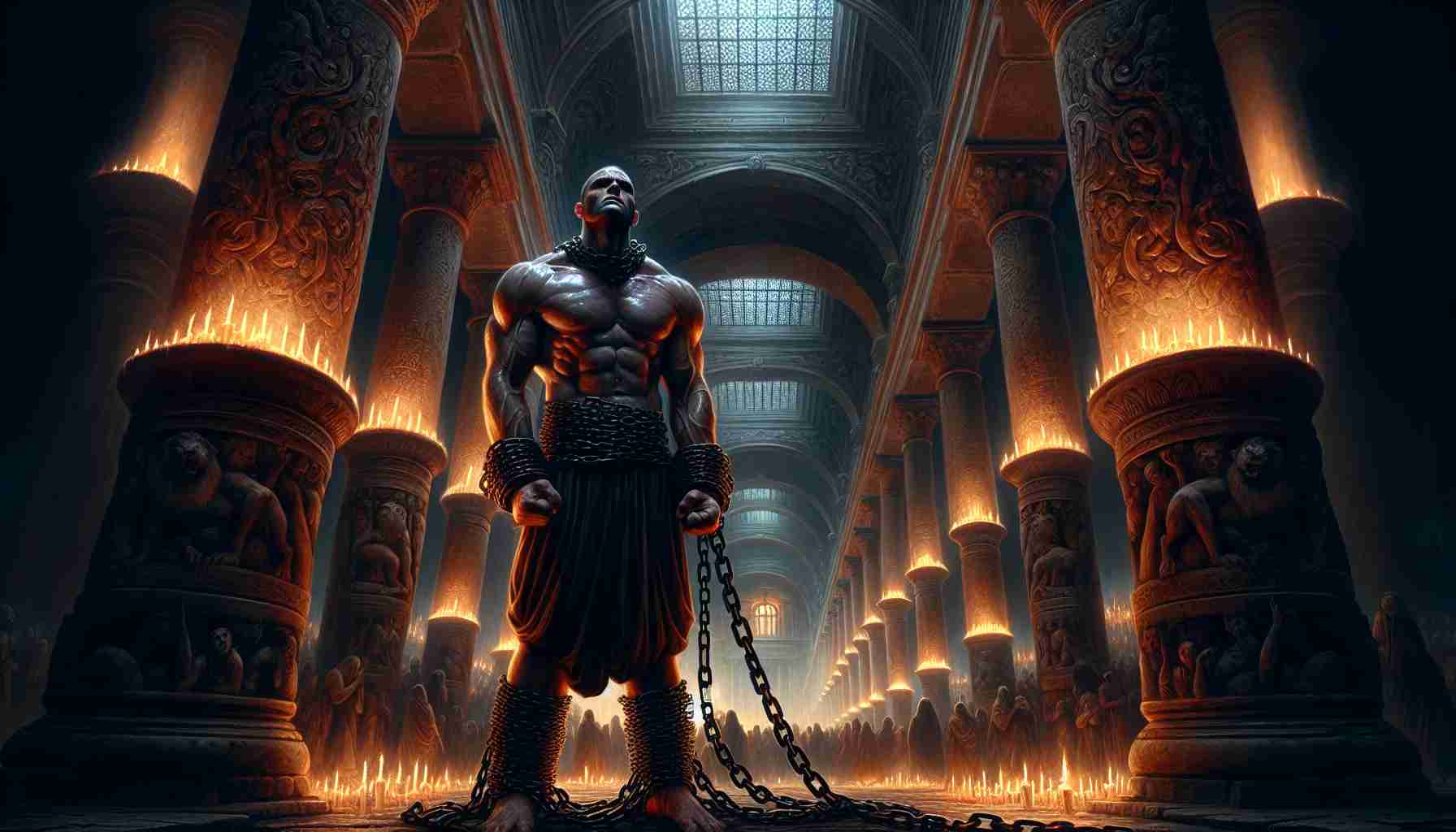

I was only a woodcutter’s son from the tribe of Dan, barely strong enough to lift my father’s axe. But Shimshon—(Samson) he was strength itself. We used to watch him from the hilltops, tossing foxes like stones and lifting city gates as if they were wooden stools. Shimshon, the judge chosen by Hashem—the name we use to speak of God with reverence—wasn’t just a warrior. He was our protector. So when his downfall came, it felt like the whole land crumbled with him.
I was in the square when they dragged him out.
The Philistine soldiers shouted, pushing back the crowds gathered for their festival. “Bring the Hebrew to entertain us!” they laughed.
At first, none of us recognized him. His hair—once as wild and powerful as the Jordan in spring—was gone. His back was bent, and heavy iron chains rattled around his wrists. But when I looked in his eyes, blind though they were, I saw the same fire I remembered as a boy.
I edged closer, helping my uncle repair the marble step under the temple pillars. No one paid attention to a boy with a chisel and dust on his face.
From where I stood, I could hear him whisper.
“Hashem,” he said, barely loud enough for me to catch, “please remember me. Just this once. Give me strength again—not for myself, but to strike those who mocked You.”
I shivered. Even without sight, he knew the Philistines had used him to make fun of our people. They thought they’d won. They didn’t see what I saw: a man who had once been brought low by love—but now stood up through faith.
You may have heard the story—how Delilah, the Philistine woman he loved, tricked him. She coaxed the secret of his strength from his lips, then betrayed him. He trusted her, and she shaved his hair—the symbol of his oath to Hashem. Without his hair, Shimshon lost his strength. Without strength, he was captured.
But they didn’t understand something important.
Hair grows back.
And faith? That grows too.
He asked me, gently, to place his hands on the two central pillars. They were thick, carved with vines and lions. “So I may lean on them,” he said. My hands trembled, but I led him there.
Then he stood still. I could barely breathe.
With a deep breath, he pushed. Muscles tensed. Chains groaned. And the entire temple—stone, wood, and pride—shook.
People screamed. The pillars cracked.
And then—
Darkness.
Dust.
Silence.
He died that day. But not as a prisoner. Not as a fool in love. He died as Shimshon the Judge—stronger in the end than he had ever been before.
I left the city that night, my heart heavy but sure. Strength isn’t always in our muscles. Sometimes it’s in our prayers, our return, our moments of courage—even after failing.
Shimshon fell. But through chains, faith, and strategy, he rose again.
And I remembered that.
I was only a woodcutter’s son from the tribe of Dan, barely strong enough to lift my father’s axe. But Shimshon—(Samson) he was strength itself. We used to watch him from the hilltops, tossing foxes like stones and lifting city gates as if they were wooden stools. Shimshon, the judge chosen by Hashem—the name we use to speak of God with reverence—wasn’t just a warrior. He was our protector. So when his downfall came, it felt like the whole land crumbled with him.
I was in the square when they dragged him out.
The Philistine soldiers shouted, pushing back the crowds gathered for their festival. “Bring the Hebrew to entertain us!” they laughed.
At first, none of us recognized him. His hair—once as wild and powerful as the Jordan in spring—was gone. His back was bent, and heavy iron chains rattled around his wrists. But when I looked in his eyes, blind though they were, I saw the same fire I remembered as a boy.
I edged closer, helping my uncle repair the marble step under the temple pillars. No one paid attention to a boy with a chisel and dust on his face.
From where I stood, I could hear him whisper.
“Hashem,” he said, barely loud enough for me to catch, “please remember me. Just this once. Give me strength again—not for myself, but to strike those who mocked You.”
I shivered. Even without sight, he knew the Philistines had used him to make fun of our people. They thought they’d won. They didn’t see what I saw: a man who had once been brought low by love—but now stood up through faith.
You may have heard the story—how Delilah, the Philistine woman he loved, tricked him. She coaxed the secret of his strength from his lips, then betrayed him. He trusted her, and she shaved his hair—the symbol of his oath to Hashem. Without his hair, Shimshon lost his strength. Without strength, he was captured.
But they didn’t understand something important.
Hair grows back.
And faith? That grows too.
He asked me, gently, to place his hands on the two central pillars. They were thick, carved with vines and lions. “So I may lean on them,” he said. My hands trembled, but I led him there.
Then he stood still. I could barely breathe.
With a deep breath, he pushed. Muscles tensed. Chains groaned. And the entire temple—stone, wood, and pride—shook.
People screamed. The pillars cracked.
And then—
Darkness.
Dust.
Silence.
He died that day. But not as a prisoner. Not as a fool in love. He died as Shimshon the Judge—stronger in the end than he had ever been before.
I left the city that night, my heart heavy but sure. Strength isn’t always in our muscles. Sometimes it’s in our prayers, our return, our moments of courage—even after failing.
Shimshon fell. But through chains, faith, and strategy, he rose again.
And I remembered that.